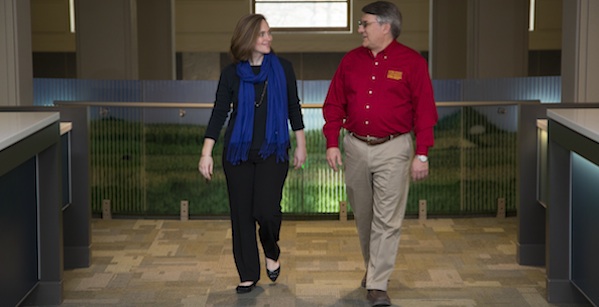
Tom Polito Reflects on Career in CALS
In high school, Tom Polito took an interest inventory that told him he should pursue a career in agriculture or theology. He says he’s been preaching agriculture ever since.
Polito (’76 agronomy, ’82 MS, ’87 PhD) is an assistant professor in both agricultural education and studies and agronomy. He’s also interim assistant dean for student services for the College Agriculture and Life Sciences. For the past 38 years, Polito has led the college’s student services office and worked simultaneously as an administrator, adviser, teacher and researcher.
As Polito prepared for retirement in May he shared a few thoughts on what it’s been like to lead the college’s student services office.
Have students changed throughout your career?
I’ve observed students to be a product of their times.
During the Vietnam War, males didn’t worry about a resume because we knew upon graduation, we would be drafted and probably traveling to exotic South Vietnam. Then in the 1970s, the big challenge was feeding the world. When the green revolution increased food production, the emphasis switched to maintaining our environment. Today students are again worried about feeding the world and doing it in a sustainable way.
As the challenges facing society evolve, so do our students.
The processes at ISU have changed too.
It doesn’t seem like I’ve been here for 38 years until I think of how technology has changed what we do. When I started, students submitted paper preregistration forms or stood in line to register. Today instead of standing in line, students can use their laptops to schedule classes while sitting on central campus!
How did the 1980s farm crisis affect the college?
The Farm Crisis of the 1980s devastated our enrollment. We dropped to 1,895 students in 1987. Also, the students were under a lot of stress. We have students who deal with stress now, but there was more then. Students were worried about grades, paying tuition and what was happening at home. For some, what was happening at home was a constant concern and weighed heavily on them —it was a challenging time.
Any memorable moments?
My memorable moments revolve around students.
For instance, I had one student who wanted to be a veterinarian but who initially struggled in his classes. He changed from pre-vet to general agriculture where I helped him choose a major and recover from his poor start. He eventually graduated and took a job in industry. A few years later, he returned to Iowa State to pursue his dream. One evening when I saw him in a restaurant, he came over to my table and said, “I’ve done it. I made it through vet school and I have a great job. Thanks for believing in me.”
Whenever students thank me for helping them or making a difference in their lives—that’s a memorable moment. I’ve been fortunate to have many in my career.
Who are your heroes?
My heroes have always been our advisers —the advisers who not only advise, but who also mentor students. They take time to meet the student’s needs and come in after hours to advise student groups. They tell students what they need to hear, even when the student may not want to hear it.
When I started we had great advisers that I emulated. Detroy Green, Fred Foreman, Jim Dinsmore (’64 fisheries and wildlife biology) and Woody Hart are a few. Today we still have great advisers, Barb Clawson (’83 ag and life sciences education, ’88 MS), Howard Tyler, Mike Retallick (’05 PhD ag and life sciences education), John Burnett and many others.
I also had the two best mentors I could hope for in emeritus associate dean of academic programs Louis Thompson (’47 MS agronomy, ’50 PhD) and former director of college career services Roger Bruene (’56 agronomy).
Those are my heroes. I have a lot of them.
What is your biggest accomplishment at Iowa State?
I have trouble identifying anything major I accomplished on my own. My accomplishments were usually team accomplishments.
I take great satisfaction that we had 4,600 students enrolled this fall, instead of 2,500. I was part of that, but so was everyone in this office, the CALS student ambassadors, our partners in the departments and the admissions office and our deans.
Even my teaching was a team effort. I convinced instructors in three other courses besides my soils course to partner in integrating our courses into a combined student experience. The same students were in all courses and the point of integration was a consulting relationship we shared with an area farmer. All the instructors will tell you it was a very rewarding experience. Many of the students told us they achieved more than they thought they could.
What’s your number one piece of advice for students?
I tell students to identify their dream job 10 years from now. Once they decide that, I tell them to use the opportunities and experiences at Iowa State to build the toolbox they will need in the future. Use summer internships, clubs, electives and advisers to acquire the knowledge and skills they need to reach their goals. I tell them to deliberately build the best toolbox they can while they are here.
What are you most looking forward to in retirement?
Last summer I took my 4-year-old grandson fishing for the first time. He caught his first fish, a 14-inch brown trout. He was grinning from ear to ear. I look forward to having time to put more grins on my grandkids’ faces. I also look forward to the time when the academic calendar is no longer controlling when my wife and I travel.



